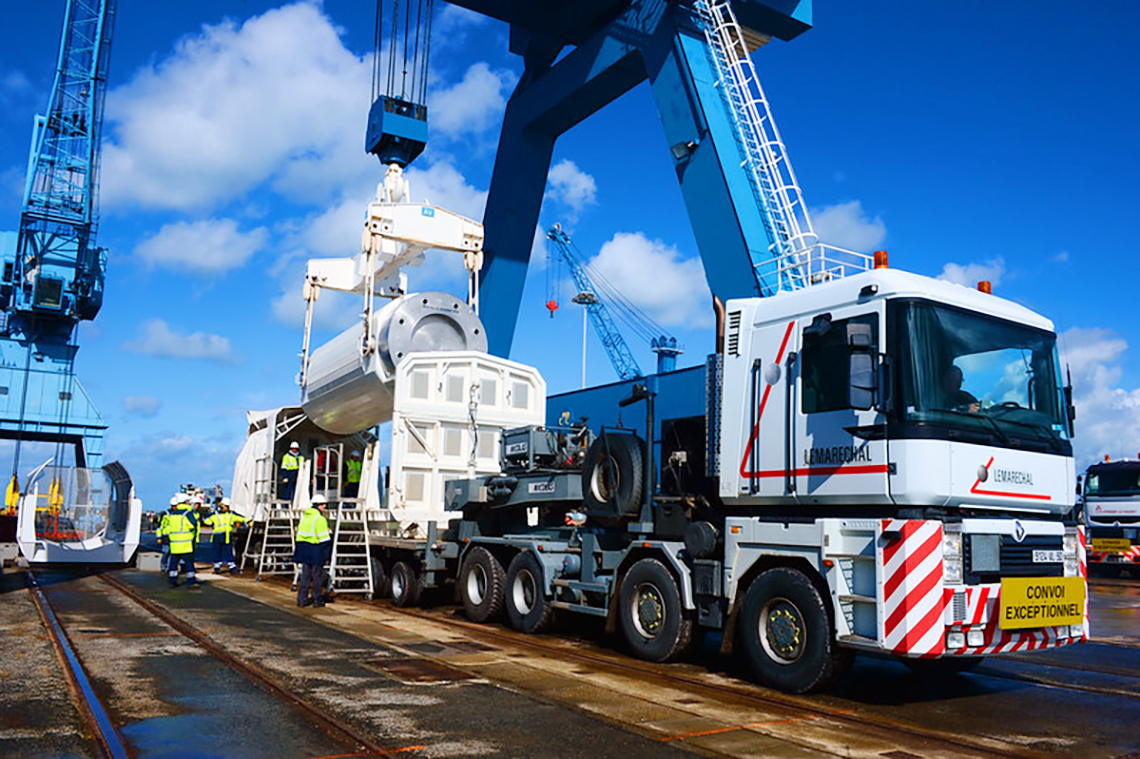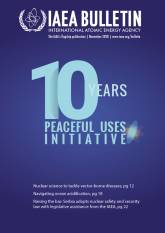
If you would like to learn more about the IAEA’s work, sign up for our weekly updates containing our most important news, multimedia and more.
Virtual School Helps Standardize Drafting Safety Regulations
Carley Willis

The Virtual School of Drafting Regulations assists countries in developing their national regulations in all areas of safety, such as the regulation of the transport of nuclear and radioactive material. (Photo: IAEA)
Virtual school helps standardize drafting safety regulations
IAEA training on drafting nuclear and radiation safety regulations now has a virtual twist — in line with the times. The IAEA recently launched a new programme, funded through the Peaceful Uses Initiative (PUI), which combines face-to-face sessions with online learning to help experts worldwide build skills and competence in drafting safety regulations in order to harmonize regulatory requirements.
The Virtual School on Drafting Safety Regulations is based on the IAEA’s traditional, in-person School, which was launched in 2010. Since then, 19 in-person courses have been held, with 60 experts involved in training more than 350 participants from around the world.
Any training involving the drafting of regulations is immensely valuable, not only for me personally but for the entire radiation sector and the country as a whole.
The School provides the participants with hands-on experience in drafting regulations that are consistent with IAEA safety standards, which represent the international consensus on nuclear safety. The courses provide professional guidance and include drafting sessions facilitated by experts, peer discussions and practical exercises to prepare the participants for developing and implementing regulations in their countries.
While the IAEA safety standards serve as recommendations to ensure global safety in the nuclear field, regulating safety is each country’s national responsibility. By taking part in the School, national authorities are able to draft regulations that are in line with both country-specific needs and IAEA standards.
“This School is an excellent opportunity for the countries involved to have trained regulators ready to support their authorities in preparing legislative documents in areas related to the peaceful uses of nuclear technology,” said Sotiris Economides, course director at the Regional Training Centre in Europe of the Greek Atomic Energy Commission. “It is an efficient way to sustain the competence of the authorities at the national level, as it reinforces the in-country preparation and training of the participants before meeting the experts and peers for the face-to-face training.”
Drafting safety standards in Seychelles
Participants in the School have the chance to submit proposals ahead of time for regulations they want help in drafting. Shawn Hunt, a radiation safety officer at the Seychelles Nuclear Safety and Radiation Protection Authority, plans to take part in the next edition of the School in 2021 in order to receive assistance in drafting follow-up legislation for addressing specific safety requirements. The regulations will mirror those outlined in the IAEA safety standards and follow current international standards, procedures and guidelines.
“This will only be the second regulation that we as an authority have drawn up,” Hunt said. “Any training involving the drafting of regulations is immensely valuable, not only for me personally but for the entire radiation sector and the country as a whole.”
Hunt’s participation in the School will build on the experiences of other officials from the Seychelles who attended in 2016. Their participation led to the amendment of the country’s first Radiation Safety and Security Act, which was adopted in 2014, bringing it in line with international standards.
“The School was a good opportunity to align our regulations with General Safety Requirements Part 3 and the model regulations of the IAEA,” said Stephanie Boniface, a senior employment officer at the Ministry of Employment, Immigration and Civil Status of Seychelles. “Additionally, we were able to share experiences with other African countries who were at different stages of drafting their regulations and with facilitators from developing countries like Seychelles, who were able to guide us on how to incorporate these provisions.”
Widening the scope
In 2019, Schools were organized by the IAEA to assist the participants in drafting regulations for both nuclear safety and nuclear security.
The School now also offers differentiated training programmes for each of the five major safety areas: nuclear safety, radiation safety, waste and transport safety, and emergency preparedness and response.
“The School creates a harmonization in regulations and brings consistency in the measures that are put in place in a given country,” said Richard Sseggane, Head of the Nuclear Security Unit at the Atomic Energy Council of Uganda, who participated in a former edition of the school in 2019. “This helps the operators and practitioners have accountability and a legal obligation to put in place sufficient measures and regulations.”
More recently, the IAEA has introduced a training component that combines radiation safety and security of radioactive material to assist the participants in drafting regulations for facilities and activities handling radiation sources. This approach aims to foster cooperation between safety and security experts to make regulation implementation more efficient and consistent.
The Virtual School on Drafting Safety Regulations is scheduled to take place for countries in Latin America and the Caribbean in March 2021. For countries in Africa, the school will take place in in 2022.




